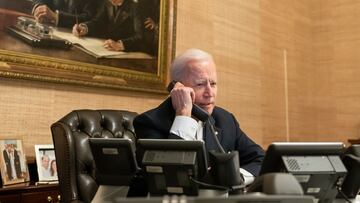What has Biden said about the possible ceasefire and conflict between Israel and Palestine?
As bombings continue in Gaza the President has called on Israeli Prime Minister Benjamin Netanyahu to bring the fighting to an end with a "negotiated two-state solution."


On Monday the White House confirmed that President Joe Biden had told Israeli Prime Minister Benjamin Netanyahu that he wants to see a ceasefire in the ongoing Israel-Palestine conflict. This is the first official mention of a ceasefire from the Biden administration.
An overview of the call has been made public by White House officials, who said that Biden “expressed his support for a cease-fire and discussed U.S. engagement with Egypt and other partners towards that end.”
BREAKING: Biden backs Gaza ceasefire for first time in call with Netanyahu https://t.co/5jMRjJHqNX
— Axios (@axios) May 17, 2021
Tensions were reignited in the contentious Gaza Strip little over a week ago with bombings between Israel and Hamas leaving countless civilians dead, although Palestine has borne the brunt of the conflict.
Pressure mounts on Biden to send a message
In recent days there have been growing calls for Biden to step in and involve the United States in the conflict by publically calling for an end to the violence. The President had been scheduled to talk with Netanyahu on Monday and a group of 28 Democratic senators signed a letter demanding Biden calls for a ceasefire.
The letter read: “To prevent any further loss of civilian life and to prevent further escalation of conflict in Israel and the Palestinian territories, we urge an immediate ceasefire.”
Joint Statement Urging Ceasefire in Middle East pic.twitter.com/nkTNFqH7re
— Jon Ossoff (@ossoff) May 16, 2021
Before today’s announcement, the Biden administration had stayed clear of the openly calling for the fighting to stop. On Saturday he said that the US’s aim was to secure “a negotiated two-state solution as the best path to reach a just and lasting resolution.”
In a recent statement, US Secretary of State Antony J. Blinken spoke of the need for a “sustainable calm” while others have demanded “restraint.”
Will Biden’s call for a ceasefire change anything?
In response to the heightening violence in the region some have wished that Biden had been stronger in his condemnation of the attacks initially. However now that he has publically called for a ceasefire to be reached, what hope is there of a swift and peaceful resolution?
Speaking to reporters on Monday, White House press secretary Jen Psaki said that the White House’s approach was to use “quiet, intensive diplomacy,” arguing that they feel they can be “most effective” without needing to wade into the conflict.
Prime Minister Benjamin Netanyahu:
— Prime Minister of Israel (@IsraeliPM) May 17, 2021
"I have just finished an assessment of the situation, as well as the approval of operational plans, with the Defense Minister, the IDF Chief-of-Staff, the head of the ISA, the head of the Mossad and the head of the National Security Council. pic.twitter.com/TshrmMKFCA
Related stories
However as the bombings have continued it appears that the President has attempted to strike a stronger tone in his dealings with Netanyahu. As recently as Sunday the Israeli Prime Minister told CBS’s ‘Face the Nation’ that his government were intent on “trying to degrade Hamas’s terrorist abilities and to degrade their will to do this again,” warning that a resolution was “not immediate.”
It remains to be seen what effect Biden’s remarks will have on the situation in Gaza but it is a notable change in the President's public comments on the issue and in his relationship with Israel.
